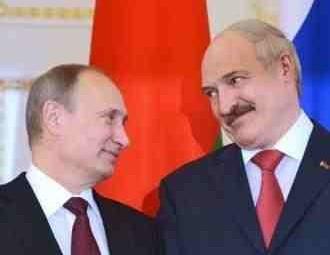Lukashenka’s role of a “mediator” won’t end his international isolation, a foreign policy expert say

Amanda Paul, a geopolitical and foreign policy analyst, in the interview with DW explains why it was the Belarus President whom the Ukrainian President asked to mediate in the Russia-Ukraine conflict.
DW: Washington once famously called Belarusian President Alexander Lukashenka "Europe's last dictator" and European governments have imposed sanctions on him. Why, then, has Ukraine's western-leaning President Petro Poroshenko asked Lukashenka of all people to mediate in the conflict?
Amanda Paul: I think first of all it's because Belarus is a close neighbor of Ukraine. It's somewhere where all parties can convene including, very importantly, those representatives that are going to come from Lugansk and Donetsk who would be perhaps fearful for their safety if they were to go farther afield. It's also obviously a country that Russia is satisfied with. It's not very far to travel.
So, I think these were the main reasons behind choosing Belarus. Of course, Lukashenka is not an ideal leader. He doesn't have good relations with the United States or the EU, but I think we have to put that aside for the moment. It's more about the geostrategic location and the ability to get the separatists into a conversation they feel safe in.
DW: But politically, can Lukashenka, who is seen as one of Russian President Vladimir Putin's closest allies, really be impartial?
Amanda Paul: As far as I'm aware, Lukashenka is not going to be involved in the discussions at all. It's only Belarus hosting them, he's not going to have anything to say. Belarus doesn't actually have a role in this contact group at all, it's merely the host. So I don't think that's actually going to be an issue.
DW: Is Belarus perhaps the only country that could be accepted by all sides - the Ukrainian government, the separatists and Moscow?
Amanda Paul: I think it's a neutral country that is acceptable by all sides. Despite what we think about Lukashenka, all of the parties involved have good relations with Belarus, which I think is the main focal point of having the meeting there. It's got nothing to do with Lukashenka. It's the most relevant country in the region to have these discussions in.
DW: You say it's more about the country itself than Lukashenka and his political record, but can you really separate the two? He is clearly anti-democratic and anti-western. Why is it that the western-oriented Ukrainian government accepts him?
Amanda Paul: Ukrainians don't see Belarus just along the lines of democracy and human rights. They have good economic and political relations with Belarus. The Russians also have close relations with them. It is more an issue of having a secure location for these discussions to take place rather than his track record in human rights and democracy, because clearly he would not be a candidate to mediate any sort of discussions.
DW: Could the act of hosting this conference be going some way in improving Lukashenka's image and break his international isolation?
Amanda Paul: I don't think it's going to break his international isolation because nothing has changed in terms of his governance and the way he rules the country, which we all know is appalling. But at the same time, if Belarus can host a discussion that's going to help in resolving the crisis, the war between Russia and Ukraine, his record needs to be put aside.
We need to focus on what the key issue is here, and it's not his human rights record. I don't think it's going to improve his position at all. The only thing that would end his isolation is to take more democratic steps.
DW: So you think it would be wise for the EU and the West to leave his political credentials aside for the moment and give this conference a chance?
Amanda Paul: I think we absolutely have to give it a chance, because we are grabbing at very thin straws already. So, saying we don't want to have the meeting in Belarus simply because we don't like Lukashenka would be really ridiculous, frankly speaking.
What's most important here is ending this war between Russia and Ukraine as quickly as possible, and to that end we need to have more dialogue and communication between all those involved. Whether or not this discussion will bring any fruitful results - which I doubt it will - it's still helpful to have it, and if it just happens to take place in Belarus, so be it.
Reference
Amanda Paul is a geopolitical and foreign policy analyst at the European Policy Centre in Brussels and a research fellow at the International Centre for Policy Studies in Kyiv.
The interview was originally published at Deutsche Welle
-
03.01
-
07.10
-
22.09
-
17.08
-
12.08
-
30.09








































